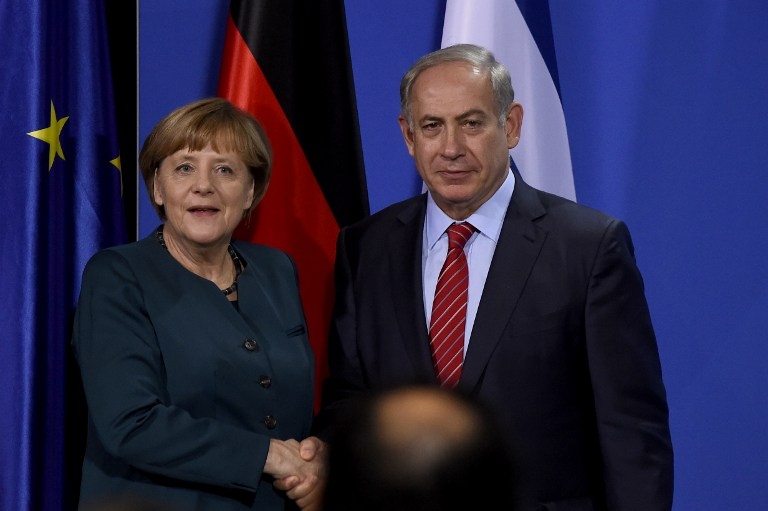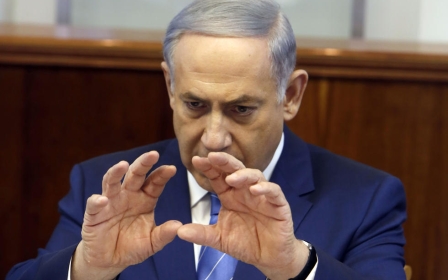Netanyahu recants parts of explosive Hitler-Mufti Holocaust speech

Prime Minister Benjamin Netanyahu has tried to walk away from parts of his speech accusing a Palestinian mufti, not Hitler, of sparking the Holocaust less than a day after first making the highly-controversial claims in Jerusalem.
On Tuesday, Netanyahu gave a speech accusing Jerusalem Grand Mufti Haj Amin al-Husseini of inciting Hitler to enact his “final solution” for the Jews and claiming that Hitler did not want to eradicate but only to expel the Jews from Europe before meeting Husseini in 1941.
"Hitler didn’t want to exterminate the Jews at the time. He wanted to expel the Jews," Netanyahu told the World Zionist Congress.
"And Haj Amin al-Husseini went to Hitler and said: 'If you expel them, they'll all come here.' 'So what should I do with them?' he asked. He said: 'Burn them.'"
However, on Wednesday shortly before flying to Germany to meet with Chancellor Angela Merkel, Netanyahu said that allegations that his comments exonerated Hitler were "absurd".
"I had no intention of exonerating Hitler from his diabolical responsibility for the extermination of European Jews," he said.
"Hitler was responsible for the final solution of the extermination of six million. It was he who took the decision. (But) it is equally absurd to ignore the role played by the mufti... who encouraged Hitler, Ribbentrop, Himmler and others to exterminate European Jewry."
The issue once again reared its head in Germany where Netanyahu staged a press conference with Merkel.
Speaking in Berlin, Netanyahu said that the "responsibility of Hitler and the Nazis for the extermination of six million Jews is clear to fair minded people" although he continued to insist that the Grand Mufti's role should not be forgotten.
"He told the Nazis to prevent the fleeing of Jews from Europe and he supported the final solution," Netanyahu said.
Merkel also stressed that she objected to any revision of history and said that her country took inherent "responsibility for the Holocaust".
"We don't see any reason to change our view of history," she said.
On Thursday, the White House criticised Netanyahu's remarks, saying: "I don't think there's any doubt here at the White House who is responsible for the Holocaust that killed six million Jews."
"We here continue to stress publicly and privately ... the importance of preventing inflammatory rhetoric, accusations or actions on both sides (that) can feed the violence," said White House spokesman Eric Schultz.
"We here continue to stress publicly and privately ... the importance of preventing inflammatory rhetoric, accusations or actions on both sides (that) can feed the violence."
Netanyahu’s claims about the Mufti have been widely ridiculed by historians.
The Israeli prime minister's claim is dismissed by most Holocaust scholars, who insist the first death camps were formed before the 1941 meeting between Husseini and Hitler. However, the idea is promoted by a few fringe researchers, according to Haaretz.
Author Zaid Jilani pointed out in an article that there were several historical references to the Nazis' "final solution" and even moves to implement the Holocaust months before the meeting.
"This statement is almost too absurd to debunk," Jilani wrote.
"The killing centres in Poland were organised under so-called Operation Reinhard, and work on these units began in October 1941, a month before the Mufti visited Jerusalem."
The Palestine Liberation Organisation secretary general Saeb Erekat said in a statement that the speech was a “sad day in history”.
"It is a sad day in history when the leader of the Israeli government hates his neighbour so much that he is willing to absolve the most notorious war criminal in history, Adolf Hitler, of the murder of six million Jews during the Holocaust," Erekat said.
Middle East Eye propose une couverture et une analyse indépendantes et incomparables du Moyen-Orient, de l’Afrique du Nord et d’autres régions du monde. Pour en savoir plus sur la reprise de ce contenu et les frais qui s’appliquent, veuillez remplir ce formulaire [en anglais]. Pour en savoir plus sur MEE, cliquez ici [en anglais].




